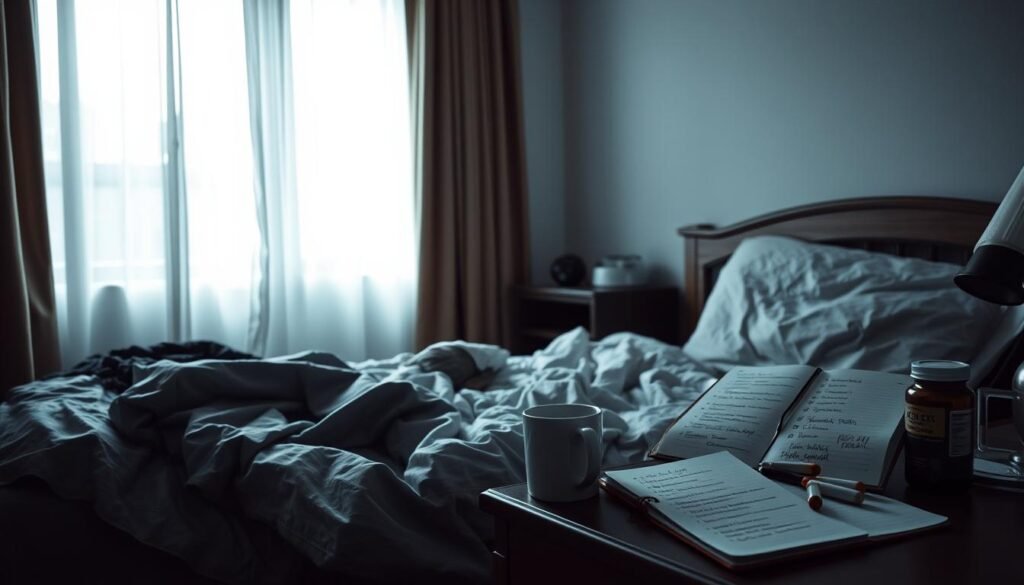About 50% of women might face hair loss due to various reasons, including missing vital vitamins. This stark fact shows how important nutrition is for our hair’s health. A lack of vitamins can lead to feeling tired and losing hair, which is more common than we might assume.
This piece explores how not getting enough vitamins affects our health, especially our hair. It’s key to know which vitamin shortage causes hair to fall out and makes us feel worn out. This knowledge helps us find the right ways to get our hair healthy and full again. We will look at the vitamins that are essential for keeping hair strong. Plus, we’ll cover the signs that show we’re not getting enough of these vitamins. Making good changes to what we eat, and possibly adding supplements, can boost both how energetic we feel and how our hair looks.
Key Takeaways
- Vitamin deficiencies are a significant factor in fatigue and hair loss.
- Common symptoms include thinning hair and decreased energy.
- Specific vitamins are vital for healthy hair growth.
- A balanced diet is essential for preventing nutrient deficiencies.
- Supplements can help restore vitamin levels for better health.
- Consulting with healthcare professionals can provide personalized solutions.
The Importance of Vitamins for Overall Health
Vitamins are key for overall health. They support our body in many ways. For example, they help fight off diseases, assist in metabolism, and mend our cells. Getting enough vitamins prevents nutritional deficiencies.
These deficiencies can make us feel bad and even get sick. A balanced diet full of vitamins keeps us energetic and healthy. A lack of them can cause tiredness, hair loss, and other problems.
For example, not having enough vitamin D might increase hair loss. It’s also linked with serious issues like diabetes and asthma. Biotin shortage can make your hair thin and your skin dry. Iron is important too; not having enough can cause hair to fall out more. These show how crucial vitamins are for our well-being.
- Vitamin D: Associated with hair loss and various chronic conditions.
- Biotin: Key for hair and skin health, with deficiencies causing notable symptoms.
- Iron: Critical for hair growth; deficiency leads to shedding.
- Folic Acid: Important for energy, with lack of it often linked to fatigue.
Understanding Hair Health
Healthy hair needs us to know the hair growth cycle well. This cycle has three main stages: anagen (growth), catagen (transition), and telogen (rest). Each stage is vital for the development and shedding of hair. During anagen, hair follicles make new cells that create hair strands, affecting hair health deeply.
Eating right greatly influences hair growth. Important vitamins and minerals help every phase, making sure follicles work their best. Lack of key nutrients can make hair weak and slow its growth. For example, not having enough iron is closely linked to hair loss, which messes up this cycle’s balance. This can cause issues like telogen effluvium.
Adding various nutrients to our diet can make hair stronger and healthier. Vitamins like B12 and D, and minerals such as zinc, are essential for hair health. B12 helps make red blood cells that bring oxygen to our hair, while vitamin D helps hair follicles grow. Not getting enough zinc, often from eating too much processed grain, can cause hair to become thin and brittle.
Caring for hair health helps the follicles, makes hair stronger, and aids its growth cycle. A diet full of key nutrients ensures hair is bright and strong. This prevents the lack of nutrients that could stop hair from growing well.
The Role of Vitamins in Hair Growth
Vitamins are key to our hair’s health and growth. Vitamin D is very important because it helps keep hair follicles healthy. This is done by aiding the growth of keratinocytes, cells that play a part in growing hair. If we don’t get enough vitamin D, we might face hair loss, showing how crucial it is.
Vitamin B12 is also critical. It helps make DNA and red blood cells, which are needed for new hair. Not having enough of this vitamin can cause noticeable hair loss. This shows how vital B12 is for keeping our hair healthy.
Iron is crucial too, especially for women and vegans who might not get enough. A lack of iron can lower hemoglobin production. Hemoglobin carries oxygen to hair follicles, which is needed for their growth. Eating iron-rich foods like meat, poultry, fish, beans, and fortified cereals can help.
Vitamins like vitamin E are also great because they fight oxidative stress. This can keep hair follicles safe, leading to better hair health and less breakage. Eating foods high in these vitamins is important for those who want to improve their hair health. Check out these antioxidant-rich vitamins.
Symptoms of Vitamin Deficiency
Vitamin deficiency symptoms can be easy to miss. They often show as signs many overlook. For example, feeling really tired can actually be a hint. Hair loss, like thin or weak hair, is another sign. These issues may point to not getting enough vitamins.
Sometimes, mood changes or feeling more irritable or down might signal a deficiency. Physical issues, such as not feeling strong or having painful bones, are clues too. It’s key to know that not everyone with vitamin D lack shows signs. But, tiredness and losing hair can occur over time.
Checking what you eat is vital if you notice these signs. If you think you’re not getting enough vitamins, talk to a doctor. For details on lacking vitamin D and its effects, visit this resource.
Common Nutritional Deficiencies Linked to Hair Loss
Nutritional deficiencies often lead to hair loss. Low levels of vitamins D, B12, and other nutrients are common in people with thinning hair. Finding these deficiencies is key for better hair care and treatments.
Some vitamins and minerals play big roles in keeping hair healthy. These include:
- Vitamin D: Lacking it affects cells that grow hair.
- Vitamin B12: This vitamin is crucial for making DNA and red blood cells, which helps avoid hair loss.
- Iron: Often seen in vegans and women with heavy periods, low iron affects oxygen delivery to hair.
- Biotin: Even though its benefits for healthy individuals are debated, many take biotin for hair health.
- Zinc: It helps the immune system and impacts hair growth. Not having enough can cause hair loss.
Filling up on these vitamins can greatly improve hair density and decrease hair fall. A table showing vitamins linked to hair health proves this:
| Vitamin | Role in Hair Health | Common Deficiency Symptoms |
|---|---|---|
| Vitamin D | Boosts cell growth for hair | Hair loss, weak follicles |
| Vitamin B12 | Necessary for DNA and red blood cells | Tiredness, thinning hair |
| Iron | Carries oxygen to hair cells | Tiredness, losing hair |
| Biotin | Encourages hair to grow | Thin hair, weak nails |
| Zinc | Boosts hair health through immunity | Shedding hair, skin problems |
What Vitamin Deficiency Causes Fatigue and Hair Loss
A link between vitamin shortages, tiredness, and losing hair exists. Knowing about this vitamin deficiency hair loss connection is crucial. It helps tackle health issues that affect daily life. These vitamins are vital for keeping up energy and healthy hair growth.
Explaining the Connection
Vitamin deficiency can make you tired because some are key for energy and cell work. If you don’t get enough of certain vitamins, you can feel weak. This can also cause hair problems, leading to visible hair loss.
Key Vitamins Involved
Some vitamins are very important for fighting fatigue and preventing hair loss. Look at the vitamins involved:
- Vitamin D: It’s very important for hair growth cycles. If you don’t have enough, your hair might break more and fall out.
- Vitamin B12: This helps make red blood cells. Not getting enough can make you tired and change your hair color.
- Iron: It carries oxygen around the body. Not having enough can lead to hair loss in men and women.
- Biotin: Lacking this can cause hair to fall out and make it look lifeless and damaged.
Knowing about these vitamins helps spot problems that could cause hair to shed more or grow slowly. Thinking about what vitamins you need can make a big difference. It can change how energetic you feel and how healthy your hair is.

Specific Vitamin Deficiencies That Contribute to Hair Loss
Understanding specific vitamin deficiencies is crucial for hair health. Each nutrient is important for hair growth. Lack of these can harm your hair’s condition.
Vitamin D Deficiency
Vitamin D is key for making new hair follicles. Without enough, you might see more hair falling out. You can get more vitamin D from the sun and eating foods like fatty fish.
Vitamin B12 Deficiency
Vitamin B12 helps make DNA and red blood cells. These are needed for hair to grow well. Not having enough B12 can lead to hair loss. Meat, eggs, and dairy products are good sources of B12. Vegetarians and vegans might need to take extra B12 supplements.
Iron Deficiency Anemia
Iron helps bring oxygen to your hair follicles. Not having enough iron can make your hair thin. Eating iron-rich foods like red meat, beans, and fortified cereals can help keep your hair healthy.
Biotin Deficiency
Biotin, or vitamin B7, is vital for breaking down fats, proteins, and carbs. Low biotin can cause your hair to become thin and brittle. Foods like eggs, nuts, and whole grains can help increase your biotin levels.
Chronic Fatigue: Symptoms and Causes
Chronic fatigue is a condition marked by extreme tiredness that doesn’t improve with rest. People with chronic fatigue often feel weak, have trouble focusing, and experience mood changes. These symptoms can greatly affect daily life and overall well-being.
Studies show that chronic fatigue may stem from various factors, such as vitamin deficiencies. Research has found that around 1 billion people worldwide don’t get enough vitamin D. In the U.S., the CDC reports that between 836,000 and 2.5 million Americans suffer from chronic fatigue syndrome (ME/CFS). This syndrome is frequently connected to low levels of vitamin D.
About 77.2% of people with chronic fatigue are also low in vitamin D, which may cause depression and chronic pain. Vitamin D is vital for a strong immune system. Supplementing vitamin D has improved health in fatigued patients. Research also links low vitamin D to hair loss in women, suggesting that higher vitamin D levels can help.
ME/CFS symptoms include:
- Less energy for activities one used to do
- Increased tiredness after physical or mental effort
- Sleep problems that don’t allow refreshing rest
ME/CFS can start after flu-like illnesses, infections, or extreme stress. Women are two to four times more likely to get it than men. These insights stress the need to understand chronic fatigue better. This understanding can lead to more effective treatment options.

Nutrient Absorption Issues
Nutrient absorption problems can really impact your health. Even if you eat well, absorption issues can stop your body from using important vitamins and minerals. This might lead to nutrient deficiencies that are hard to spot until you start seeing symptoms.
Conditions like gastrointestinal disorders can cause malabsorption. These disorders make it hard for your body to digest food well. If you have chronic diarrhea, your body might not take in key nutrients. This can lead to big weight loss and feeling very tired.
Certain diseases, like celiac disease and inflammatory bowel disease, can make it hard for your body to absorb nutrients. There are also specific problems, like trouble absorbing carbohydrates or fats. This usually results in symptoms like gas pain and bloating.
Nutrient absorption issues do more than make you feel tired or cause hair loss. Being low on important vitamins can lead to serious health problems. These can include diabetes and heart disease. It can also hurt your blood and immune system, leading to bigger health issues.
| Type of Malabsorption | Causes | Symptoms |
|---|---|---|
| Carbohydrate Malabsorption | Enzyme insufficiency, bacterial overgrowth | Gas pain, bloating, chronic diarrhea |
| Fat Malabsorption | Bile acid deficiency, pancreatic insufficiency | Steatorrhea (greasy stools), weight loss |
| Protein Malabsorption | Food intolerances, intestinal damage | Muscle wasting, fatigue, skin issues |
Understanding these dynamics is key to solving nutritional deficiencies. People with nutrient absorption problems might need special care to get better.
Dietary Supplements: A Solution?
Dietary supplements can greatly help with vitamin deficiencies that may cause health problems like hair loss. It’s hard for many people to get enough vitamins and minerals from food alone. Here, supplements for deficiency become a handy way to boost nutrient intake.
It’s important to talk to healthcare professionals before starting any dietary supplements. They help choose the right products and doses for your health needs. Taking vitamin D, for example, can lead to hair regrowth for those with deficiencies. And this doesn’t require any surgeries.
Regular blood tests are good to keep vitamin D levels right, between 40-100 ng/ml. This helps prevent too much vitamin D, which can be harmful. Using the right vitamins and minerals supplements improves health. For those missing nutrients in their diet, it’s a smart choice.

| Vitamin | Recommended Daily Allowance (RDA) | Common Symptoms of Deficiency | Sources of Supplementation |
|---|---|---|---|
| Vitamin D | 600 IU | Hair loss, fatigue | Vitamin D3 capsules, tablets |
| Vitamin A | 900 mcg RAE | Increased infection risk | Carotenoid supplements |
| Vitamin B12 | 2.4 mcg | Fatigue, weakness | B12 injections, sublingual tablets |
| Iron | 18 mg (women), 8 mg (men) | Hair loss, paleness | Iron ferrous sulfate tablets |
Adding dietary supplements to your daily routine can greatly aid in fixing deficiencies. This is especially true for problems with hair health and vitality.
Natural Remedies to Combat Deficiencies
Fighting vitamin deficiency can be done with natural remedies for deficiencies, mainly through diet. Adding foods full of essential vitamins to your meals is key. Focus on eating leafy greens, citrus fruits, nuts, and fatty fish to boost your nutrient levels and improve your health.
Simple changes to your diet can make a big difference in your vitamin levels. For example, eating fortified products can reduce deficiencies. Try fortified cereals, nutritional yeast, and plant-based milk for important nutrients. These can make your hair stronger and raise your energy levels.
Herbal supplements offer additional support. Choices like spirulina, ashwagandha, and ginseng can be helpful. Studies show these herbs help your body absorb nutrients better. This helps prevent vitamin deficiencies.
A healthy lifestyle is vital in fighting vitamin deficiency. Getting enough sleep, staying hydrated, and managing stress well are important. These habits improve your overall health and help your body use nutrients better. This approach supports both your hair’s health and your energy.
| Vitamin | Food Sources | Potential Effects of Deficiency |
|---|---|---|
| Vitamin A | Sweet potatoes, carrots, dark leafy greens | Dry skin, brittle hair, increased shedding |
| Vitamin B12 | Meat, dairy products, fortified cereals | Fatigue, hair thinning, irritability |
| Vitamin C | Citrus fruits, bell peppers, strawberries | Hair breakage, split ends |
| Vitamin D | Fatty fish, egg yolks, fortified dairy | Hair shedding, weakened immune function |
| Vitamin E | Nuts, seeds, vegetable oils | Brittle hair, scalp irritation |
Adopting these natural remedies for deficiencies can create a strong base for your health. This well-rounded approach effectively fights vitamin deficiency and promotes a healthy lifestyle.
Conclusion
Knowing how vitamin shortages affect tiredness and hair loss is key. Studies highlight that alopecia impacts millions worldwide. It’s more common when paired with poor nutrition, stress, and heredity. Vitamins are crucial for energy and hair growth.
Improving life quality is possible by dealing with these vitamin shortages. Eating better and taking the right supplements can combat hair loss and tiredness. Adding vitamin D, biotin, and iron helps. It boosts hair growth and increases energy.
Regular blood tests uncover these shortages. This means people can find the best diet and lifestyle changes for them. It’s a customized fix.
By understanding what our bodies need, we can fight hair loss and tiredness. We should focus on key vitamins for strong hair and good health. This way, everyone can lead a healthier and happier life, full of energy.